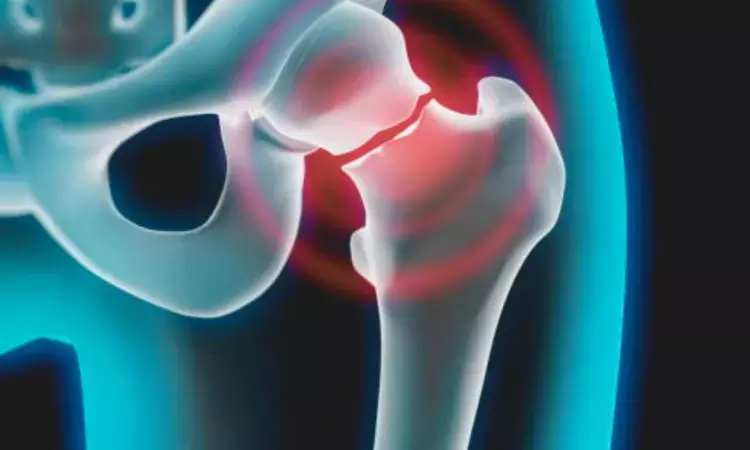- Home
- Medical news & Guidelines
- Anesthesiology
- Cardiology and CTVS
- Critical Care
- Dentistry
- Dermatology
- Diabetes and Endocrinology
- ENT
- Gastroenterology
- Medicine
- Nephrology
- Neurology
- Obstretics-Gynaecology
- Oncology
- Ophthalmology
- Orthopaedics
- Pediatrics-Neonatology
- Psychiatry
- Pulmonology
- Radiology
- Surgery
- Urology
- Laboratory Medicine
- Diet
- Nursing
- Paramedical
- Physiotherapy
- Health news
- Fact Check
- Bone Health Fact Check
- Brain Health Fact Check
- Cancer Related Fact Check
- Child Care Fact Check
- Dental and oral health fact check
- Diabetes and metabolic health fact check
- Diet and Nutrition Fact Check
- Eye and ENT Care Fact Check
- Fitness fact check
- Gut health fact check
- Heart health fact check
- Kidney health fact check
- Medical education fact check
- Men's health fact check
- Respiratory fact check
- Skin and hair care fact check
- Vaccine and Immunization fact check
- Women's health fact check
- AYUSH
- State News
- Andaman and Nicobar Islands
- Andhra Pradesh
- Arunachal Pradesh
- Assam
- Bihar
- Chandigarh
- Chattisgarh
- Dadra and Nagar Haveli
- Daman and Diu
- Delhi
- Goa
- Gujarat
- Haryana
- Himachal Pradesh
- Jammu & Kashmir
- Jharkhand
- Karnataka
- Kerala
- Ladakh
- Lakshadweep
- Madhya Pradesh
- Maharashtra
- Manipur
- Meghalaya
- Mizoram
- Nagaland
- Odisha
- Puducherry
- Punjab
- Rajasthan
- Sikkim
- Tamil Nadu
- Telangana
- Tripura
- Uttar Pradesh
- Uttrakhand
- West Bengal
- Medical Education
- Industry
Liver Function Significantly Impacts Postoperative Recovery in Femoral Neck Fractures: Study Finds

China: A new study has revealed that liver function status plays a crucial role in postoperative recovery among femoral neck fracture patients, influencing inflammation control, bone metabolism, and the risk of complications.
The research, published in BMC Surgery by Hao Weng and colleagues from the Department of Orthopedics, The People’s Hospital of Qijiang District, Chongqing, China, investigated how varying degrees of liver function impairment affect perioperative outcomes and recovery in patients undergoing surgery for femoral neck fractures.
The study included 104 patients, divided into three groups based on liver function: normal function (NG, 40 patients), mild impairment (MIG, 38 patients), and moderate impairment (MOG, 26 patients). Researchers assessed perioperative indicators such as surgical blood loss and hospital stay, measured inflammatory factors, immunoglobulins, and bone metabolism markers before and 14 days after surgery, and tracked postoperative complications, including deep vein thrombosis (DVT) and heterotopic ossification.
The study revealed the following findings:
- Patients with moderate liver impairment had significantly worse postoperative outcomes than those with mild impairment or normal liver function.
- The moderate impairment group experienced higher surgical blood loss and longer hospital stays.
- Elevated pro-inflammatory markers were observed in patients with moderate liver dysfunction.
- Bone turnover activity was reduced in these patients.
- The incidence of complications, including deep vein thrombosis (DVT) and heterotopic ossification, was higher.
- Liver dysfunction led to persistently elevated pro-inflammatory cytokines (TNF-α, IL-6) and insufficient anti-inflammatory response (IL-10).
- Bone metabolism was impaired, with reduced β-CTX levels and diminished PINP elevation.
- These factors contributed to delayed fracture healing, prolonged recovery, and increased risk of adverse outcomes.
Based on these insights, the authors recommend that liver function assessment should be integrated into the management of femoral neck fracture patients. Preoperative evaluation should include Child-Pugh classification and AST levels to stratify patients by risk. Those with moderate liver impairment (Child-Pugh C or AST > 80 U/L) should receive preoperative optimization, including correction of coagulation function and nutritional support, with elective surgery postponed until liver function stabilizes.
The study suggests that intraoperative and postoperative strategies for high-risk patients should focus on minimally invasive surgical techniques, limiting surgical duration, and monitoring inflammatory and bone metabolism markers. Prophylactic measures such as low-dose glucocorticoids for elevated TNF-α, vitamin D and calcium supplementation, and early initiation of low-molecular-weight heparin for DVT prevention are recommended. Additionally, attention to hepatic encephalopathy, ascites, and electrolyte balance, with multidisciplinary consultation, can further reduce postoperative risks.
"The study highlights the systematic influence of liver function on postoperative recovery in femoral neck fracture patients. By adopting an integrated approach encompassing liver function assessment, stratified interventions, and multidisciplinary collaboration, clinical outcomes can be significantly improved," the authors wrote.
They suggest that future multicenter research should explore the molecular mechanisms linking liver function to bone healing, providing a basis for precision medicine in orthopedic care.
Reference:
Weng, H., Zhu, L., Mei, Z. et al. Analysis of serum inflammatory factors, immune status, and prognosis in patients with different degrees of femoral neck fractures. BMC Surg 25, 454 (2025). https://doi.org/10.1186/s12893-025-03120-3
Dr Kamal Kant Kohli-MBBS, DTCD- a chest specialist with more than 30 years of practice and a flair for writing clinical articles, Dr Kamal Kant Kohli joined Medical Dialogues as a Chief Editor of Medical News. Besides writing articles, as an editor, he proofreads and verifies all the medical content published on Medical Dialogues including those coming from journals, studies,medical conferences,guidelines etc. Email: drkohli@medicaldialogues.in. Contact no. 011-43720751
Next Story


